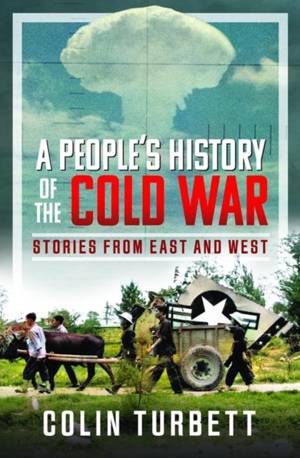
- Retrait gratuit dans votre magasin Club
- 7.000.000 titres dans notre catalogue
- Payer en toute sécurité
- Toujours un magasin près de chez vous
- Retrait gratuit dans votre magasin Club
- 7.000.000 titres dans notre catalogue
- Payer en toute sécurité
- Toujours un magasin près de chez vous
34,95 €
+ 69 points
Description
Between the closing battles of the Second World War and the collapse of the Soviet Union in 1991, the Cold War cast a shadow over the lives of people throughout the world. while open conflict was avoided between the ideologically competing superpowers and their principal allies, millions died in battlegrounds in parts of the world that were usually far from Moscow, Washington and London.
The threat of nuclear annihilation was omnipresent, but at the same time mutually assured destruction tempered conflict and focused minds. Subtle (and not so subtle) attempts to influence popular opinion either way were apparent in everyday life on both sides of the divide. while the power of the dollar and the burgeoning costs of the arms race eventually broke the Soviet economy, the idea that capitalism 'won' the the Cold War seems misplaced, especially if one considers events that have happened since, including very recent armed conflict.
The book takes the reader through main events of the period, but focuses on the impact on ordinary citizens East and West and the view of events from their perspective. This is a story of how economies on both sides were built around war preparations and the advance of destructive technologies that had no social benefits apart from the provision of employment. Sources used are unusual in not fitting the western-based narratives that pervade both academic histories and popular accounts.
However, this book is not an apology for the more oppressive aspects of Soviet policy as the USSR struggled to build 'really existing socialism' within its own borders and the Eastern Bloc countries under its immediate influence. Instead, it brings a people's perspective from both sides onto this important period of recent history, whose consequences are very much still with us as we face modern challenges around climate change and growing inequality across our world. A People's History of the Cold War - Stories from East and West captures the mood of the times with its extensive contemporary illustrations.
The threat of nuclear annihilation was omnipresent, but at the same time mutually assured destruction tempered conflict and focused minds. Subtle (and not so subtle) attempts to influence popular opinion either way were apparent in everyday life on both sides of the divide. while the power of the dollar and the burgeoning costs of the arms race eventually broke the Soviet economy, the idea that capitalism 'won' the the Cold War seems misplaced, especially if one considers events that have happened since, including very recent armed conflict.
The book takes the reader through main events of the period, but focuses on the impact on ordinary citizens East and West and the view of events from their perspective. This is a story of how economies on both sides were built around war preparations and the advance of destructive technologies that had no social benefits apart from the provision of employment. Sources used are unusual in not fitting the western-based narratives that pervade both academic histories and popular accounts.
However, this book is not an apology for the more oppressive aspects of Soviet policy as the USSR struggled to build 'really existing socialism' within its own borders and the Eastern Bloc countries under its immediate influence. Instead, it brings a people's perspective from both sides onto this important period of recent history, whose consequences are very much still with us as we face modern challenges around climate change and growing inequality across our world. A People's History of the Cold War - Stories from East and West captures the mood of the times with its extensive contemporary illustrations.
Spécifications
Parties prenantes
- Auteur(s) :
- Editeur:
Contenu
- Nombre de pages :
- 240
- Langue:
- Anglais
Caractéristiques
- EAN:
- 9781399087520
- Date de parution :
- 23-03-23
- Format:
- Livre relié
- Format numérique:
- Genaaid
- Dimensions :
- 164 mm x 241 mm
- Poids :
- 748 g







